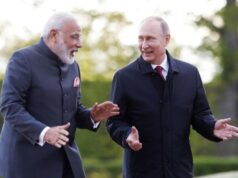Prime Minister Narendra Modi met with U.S. President Donald Trump at the White House on Thursday, marking their first official engagement since Trump’s return to office in January.
The high-profile discussions centered on strengthening diplomatic relations, expanding trade, addressing recent tariff concerns, and discussing China’s growing global influence.
Amid growing trade tensions, Trump reaffirmed his administration’s commitment to enforcing reciprocal tariffs, which would impose equivalent duties on imports from nations with high tariff rates, including India.
“Whatever India charges us, we’ll charge them; reciprocal tariffs are the fair way to go,” said Trump.
Despite this, both leaders expressed optimism about expanding economic cooperation.
Speaking at the joint press briefing, Modi emphasized the importance of India-U.S. ties, stating, “The partnership between the world’s oldest and largest democracies is built on trust, shared values, and a common vision for progress.”
Trump echoed this sentiment, calling Modi a “terrific leader” and expressing confidence in future trade agreements that would benefit both nations.
Some Key Outcomes:
- Energy Partnership: Modi and Trump signed a landmark agreement positioning the U.S. as India’s primary oil and natural gas supplier.
- Trade and Tariffs: Trump reiterated his stance on reciprocal tariffs, emphasizing the need for parity in trade duties, with India being a significant focus of his policy.
- Extradition Agreement: The U.S. approved the extradition of Tahawwur Rana, an accused in the 26/11 Mumbai attacks, underscoring closer cooperation on security matters.
- Strategic Engagements: Modi held discussions with U.S. National Security Advisor Michael Waltz, intelligence chief Tulsi Gabbard, and entrepreneur Vivek Ramaswamy, further cementing bilateral cooperation.
- China and Global Security: The leaders discussed strategies to counter China’s expanding influence in the Indo-Pacific region and its aggressive trade policies.
- Vision for Growth: Modi highlighted the synergy between the U.S.’s “Make America Great Again” (MAGA) initiative and India’s “Viksit Bharat 2047” vision, advocating a “MEGA” partnership for economic prosperity.“We have had a fantastic relationship with Prime Minister Modi, and I believe our trade partnerships will only grow stronger. We are looking forward to making tremendous deals that benefit both countries,” added Trump.
Trump also addressed concerns about China’s economic policies, stating, “We need to ensure that trade remains fair. China has exploited global trade systems for too long, and we cannot let that continue. We are working with our allies, including India, to counter unfair practices.”
A key highlight of the meeting was India’s commitment to significantly increase oil and gas imports from the U.S., further diversifying its energy sources. Trump hailed the agreement as a “groundbreaking development,” noting that India’s reformed policies would welcome U.S. nuclear technology, creating new opportunities for American businesses.
“Energy security is crucial for India’s development, and this agreement ensures a stable and reliable supply. We are committed to strengthening our energy ties with the U.S. and embracing technological advancements that benefit both our nations,” said Modi.
The meeting also addressed critical security concerns, with Trump announcing the immediate extradition of Tahawwur Rana to India. This decision was presented as a testament to the strengthening law enforcement and intelligence cooperation between the two nations.
Additionally, Modi met with top U.S. officials, including NSA Michael Waltz and DNI Tulsi Gabbard, discussing a range of strategic and defense issues. Gabbard’s recent appointment as the Director of National Intelligence added significance to the discussions,
“We’ll be increasing military sale to India this year, will work together to counter terrorism,” said Trump.
China was a major topic of discussion, particularly in relation to security in the Indo-Pacific region. Trump emphasized the need for a strong partnership to counter China’s influence, stating, “China’s aggressive expansion in the South China Sea and its economic policies require a unified response from the global community. The U.S. and India will continue working together to maintain stability in the region.”
Modi echoed these concerns, adding, “India remains committed to a free, open, and inclusive Indo-Pacific. We will work closely with the U.S. and other like-minded nations to ensure peace, stability, and prosperity in the region.”
President Trump gifted Prime Minister Modi his book, Our Journey Together, and showed Modi a photo of his 2020 visit to the Taj Mahal.
Modi’s visit to Washington follows his trip to France, where he engaged in discussions with President Emmanuel Macron on areas such as artificial intelligence and civil nuclear energy. Emphasizing the importance of sustaining momentum in India-U.S. relations, Modi said: “This visit is an opportunity to build upon past successes and deepen our collaboration for the future.”
Both leaders expressed a commitment to doubling bilateral trade by 2030 and fostering stronger economic, technological, and strategic ties, setting a positive trajectory for India-U.S. relations, despite prevailing trade challenges.
In a career spanning three decades and counting, Ramananda (Ram to his friends) has been the foreign editor of The Telegraph, Outlook Magazine and the New Indian Express. He helped set up rediff.com’s editorial operations in San Jose and New York, helmed sify.com, and was the founder editor of India.com.
His work has featured in national and international publications like the Al Jazeera Centre for Studies, Global Times and Ashahi Shimbun. But his one constant over all these years, he says, has been the attempt to understand rising India’s place in the world.
He can rustle up a mean salad, his oil-less pepper chicken is to die for, and all it takes is some beer and rhythm and blues to rock his soul.
Talk to him about foreign and strategic affairs, media, South Asia, China, and of course India.




